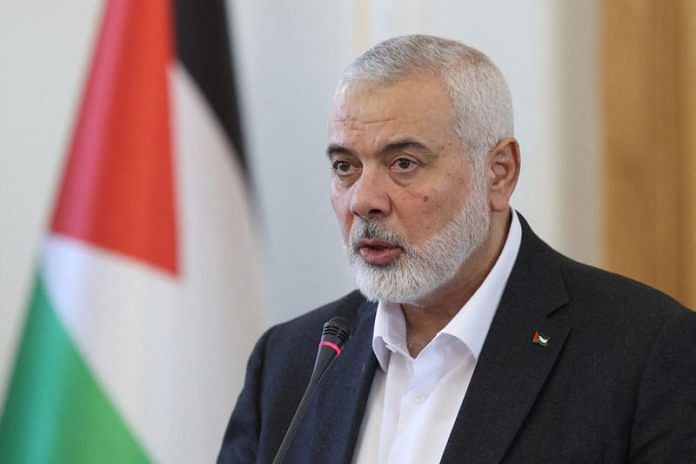By Nidal al-Mughrabi, Parisa Hafezi
CAIRO/DUBAI (Reuters) -Hamas leader Ismail Haniyeh was assassinated early on Wednesday morning in Iran, the Palestinian militant group and Tehran said, drawing threats of revenge on Israel in a region already shaken by the war in Gaza and a deepening conflict in Lebanon.
Iran’s Revolutionary Guards confirmed the death of Haniyeh, hours after he attended a swearing in ceremony for the country’s new president, and said it was investigating.
Haniyeh, normally based in Qatar, has been the face of Hamas’s international diplomacy as the war set off by the Hamas-led attack on Israel on Oct. 7 has raged in Gaza. He had been taking part in internationally-brokered talks on reaching a ceasefire in the Palestinian enclave.
Hamas’ armed wing said in a statement Haniyeh’s killing would “take the battle to new dimensions and have major repercussions”, while Iran declared three days of national mourning and vowed to retaliate.
Iran’s Supreme Leader Ali Khamenei said Israel had provided the grounds for “harsh punishment for itself” and it was Tehran’s duty to avenge the Hamas leader’s death as it had occurred in the Iranian capital. Iranian forces had already made strikes directly on Israel earlier in the Gaza war.
There was no comment nor claim of responsibility from Israel. The Israeli military said it was assessing the situation but had not issued any new security guidelines for civilians.
Prime Minister Benjamin Netanyahu was expected to meet for consultations with security officials at 4 p.m. (1300 GMT).
U.S. Secretary of State Antony Blinken, at an event in Singapore, sidestepped a question on Haniyeh’s killing, saying a ceasefire deal in Gaza was key to avoiding wider regional escalation.
“I’m not going to speculate on what impact any one event might have on that, I’ve learned over many years.”
He told Channel News Asia that the U.S. had neither been aware of nor involved in the killing.
The assassination, which took place less than 24 hours after Israel claimed to have killed the Hezbollah commander it said was behind a deadly strike in the Israeli-occupied Golan Heights, appears to set back chances of any imminent ceasefire agreement in the 10-month-old war Gaza.
“This assassination by the Israeli occupation of Brother Haniyeh is a grave escalation that aims to break the will of Hamas,” senior Hamas official Sami Abu Zuhri told Reuters.
He said Hamas, the Palestinian Islamist group that ruled Gaza prior to the Israeli assault, would continue the path it was following.
Israeli Defence Minister Yoav Gallant said Israel was not trying to escalate the war but was prepared for all scenarios. Visiting an air defence battery, he praised the forces who carried out the attack on the Hezbollah commander in Beirut.
Qatar, which has been brokering talks aimed at halting the fighting in Gaza along with Egypt, condemned Haniyeh’s killing as a dangerous escalation of the conflict.
“Political assassinations and continued targeting of civilians in Gaza while talks continue leads us to ask, how can mediation succeed when one party assassinates the negotiator on other side?” Prime Minister Sheikh Mohammed bin Abdulrahman Al Thani wrote on X.
Egypt said it showed a lack of political will on Israel’s part to calm tensions. China, Russia, Turkey and Iraq also condemned it.
Iran’s top security body met to decide strategy in reaction to the death of Haniyeh, a source with knowledge of the situation said.
Palestinian President Mahmoud Abbas condemned the killing and Palestinian factions in the Israeli-occupied West Bank called for a strike and mass demonstrations.
PUBLIC FACE OF HAMAS
Haniyeh’s assassination comes as Israel’s campaign in Gaza approaches the end of its 10th month with no sign of an end to a war that has threatened to spiral into a wider regional conflict. Ceasefire talks brokered by Egypt and Qatar appear to have faltered.
At the same time, the risk of a war between Israel and Hezbollah has grown following the strike in the Golan Heights that killed 12 children in a Druze village on Saturday and the subsequent killing of the senior Hezbollah commander Fuad Shukr.
Hezbollah has not yet confirmed Shukr’s death, but said he was in the building hit by an Israeli strike.
The International Criminal Court prosecutor’s office requested an arrest warrant for Haniyeh over alleged war crimes at the same time it issued a similar request against Netanyahu.
Appointed to the Hamas top job in 2017, he has moved between Turkey and Qatar’s capital Doha, escaping the travel curbs of the blockaded Gaza Strip and enabling him to act as a negotiator in ceasefire talks or to talk to Hamas’ ally Iran. Three of his sons were killed in an Israeli airstrike in April.
His death, following the killing of his deputy Saleh Al-Arouri in January by Israel, leaves Yehya Al-Sinwar, the Hamas chief in the Gaza Strip and the architect of the Oct. 7 attack on Israel, and Zaher Jabarin, the head of the group in the West Bank, in place but in hiding.
The war started on Oct. 7 when Hamas-led fighters broke through security barriers around Gaza and carried out a devastating attack on Israeli communities, killing 1,200 people and abducting some 250 hostages into Gaza, by Israeli tallies.
In response, Israel launched a ground and air offensive in the coastal enclave that has killed more than 39,400 people, according to Gaza health officials, and left more than 2 million facing a humanitarian crisis.
(Parisa Hafezi reported from Dubai, Additional reporting from Enas Alashray and Ahmed Tolba in Cairo, Xinghui Kok in Singapore; Writing by Sharon Singleton; Editing by Angus MacSwan)
Disclaimer: This report is auto generated from the Reuters news service. ThePrint holds no responsibilty for its content.



